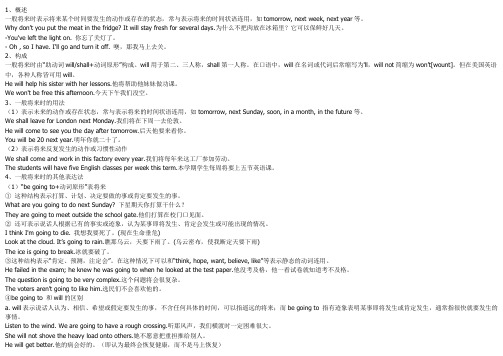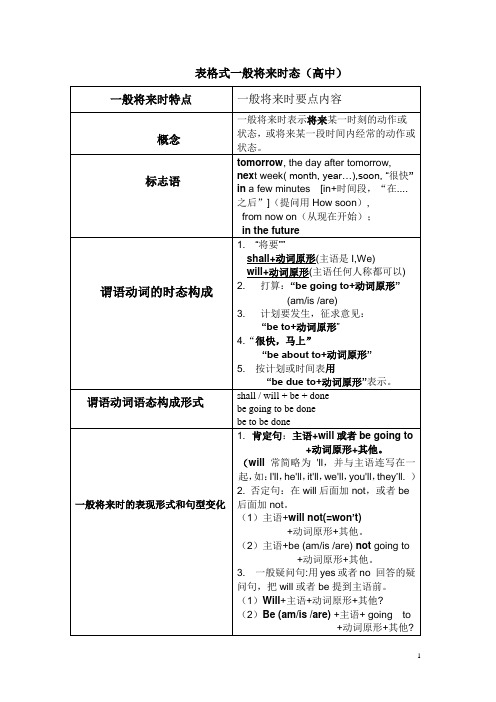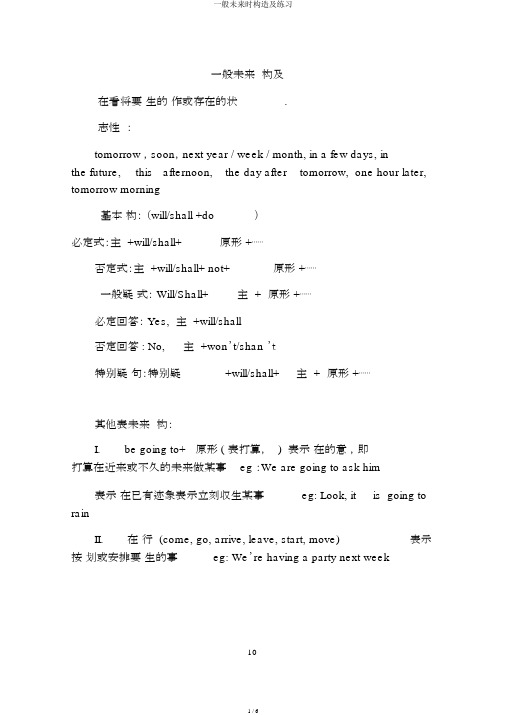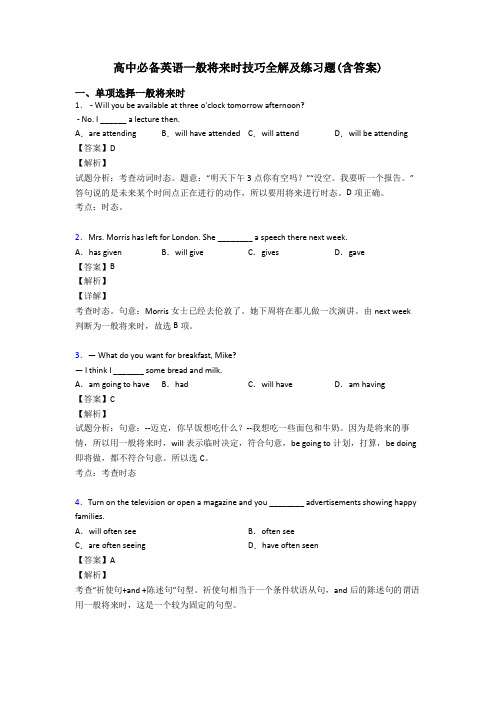高中版--详解表格式一般将来时练习
- 格式:doc
- 大小:61.00 KB
- 文档页数:7

1、概述一般将来时表示将来某个时间要发生的动作或存在的状态,常与表示将来的时间状语连用,如tomorrow, next week, next year等。
Why don’t you put the meat in the fridge? It will stay fresh for several days.为什么不把肉放在冰箱里?它可以保鲜好几天。
-You've left the light on. 你忘了关灯了。
- Oh , so I have. I'll go and turn it off. 噢,那我马上去关。
2、构成一般将来时由“助动词will/shall+动词原形”构成。
will用于第二、三人称,shall第一人称。
在口语中,will在名词或代词后常缩写为'll,will not简缩为won’t[wount]。
但在美国英语中,各种人称皆可用will。
He will help his sister with her lessons.他将帮助他妹妹做功课。
We won't be free this afternoon.今天下午我们没空。
3、一般将来时的用法(1)表示未来的动作或存在状态,常与表示将来的时间状语连用,如tomorrow, next Sunday, soon, in a month, in the future等。
We shall leave for London next Monday.我们将在下周一去伦敦。
He will come to see you the day after tomorrow.后天他要来看你。
You will be 20 next year.明年你就二十了。
(2)表示将来反复发生的动作或习惯性动作We shall come and work in this factory every year.我们将每年来这工厂参加劳动。

高中最新版--详解表格式一般将来时练习 -CAL-FENGHAI-(2020YEAR-YICAI)_JINGBIAN表格式一般将来时态(高中)一般将来时的用法(一) 表示将来的动作或状态Tomorrow will be Sunday. The rain will stop soon.Shall we go there at five Will you please open the door?(二)表示“将”来经常发生的动作。
We shall go to work by bus next week.Will you be at home next month(三)一般将来时的其他用法1. 一般将来时表示将来某一时刻的动作或状态,其表达形式除了“shall(第一人称),will(第二、三人称)+动词原形构成”外,还有以下几种形式。
2 . “be going to+动词原形”表即将发生的或最近“打算”有目标的进行的事。
a. 主语的意图,即将做某事。
What are you going to do tomorrow?b. 计划,安排要发生的事。
The play is going to be produced next month。
c. 有迹象要发生的事Look at the dark clouds, there is going to be a storm.①It is going to rain. ②We are going to have a meeting today.3. “be to+动词原形”表示按计划要发生的事或征求对方意见按计划或正式安排将发生的事。
①Are we to go on with this work? ②The boy is to go to school tomorrow.4. “be about to+动词原形”表示即将发生的动作,意为:“很快,马上”,马上做某事,后面一般不跟时间状语。

表格式一般将来时态(高中)一般将来时的用法(一) 表示将来的动作或状态Tomorrow will be Sunday. The rain will stop soon.Shall we go there at five? Will you please open the door?(二)表示“将”来经常发生的动作。
We shall go to work by bus next week.Will you be at home next month?(三)一般将来时的其他用法1. 一般将来时表示将来某一时刻的动作或状态,其表达形式除了“shall(第一人称),will(第二、三人称)+动词原形构成”外,还有以下几种形式。
2 . “be going to+动词原形”表即将发生的或最近“打算”有目标的进行的事。
a. 主语的意图,即将做某事。
What are you going to do tomorrow?b. 计划,安排要发生的事。
The play is going to be produced next month。
c. 有迹象要发生的事Look at the dark clouds, there is going to be a storm.①It is going to rain. ②We are going to have a meeting today.3. “be to+动词原形”表示按计划要发生的事或征求对方意见按计划或正式安排将发生的事。
①Are we to go on with this work? ②The boy is to go to school tomorrow.4. “be about to+动词原形”表示即将发生的动作,意为:“很快,马上”,马上做某事,后面一般不跟时间状语。
We are about to leave.我们马上就走。
He is about to leave for Beijing.温馨提示:be about to 不能与tomorrow, next week等表示明确将来时的时间状语连用。

一般未来构及在看将要生的作或存在的状.志性:tomorrow ,soon,next year / week / month, in a few days, inthe future, this afternoon, the day after tomorrow, one hour later, tomorrow morning基本构:(will/shall +do)必定式:主 +will/shall+原形+⋯⋯否定式:主 +will/shall+ not+原形+⋯⋯一般疑式: Will/Shall+主+原形+⋯⋯必定回答: Yes, 主 +will/shall否定回答 : No,主+won’t/shan’t特别疑句:特别疑+will/shall+主+原形+⋯⋯其他表未来构:I.be going to+ 原形 ( 表打算, ) 表示在的意,即打算在近来或不久的未来做某事eg :We are going to ask him表示在已有迹象表示立刻収生某事eg: Look, it is going to rainII.在行 (come, go, arrive, leave, start, move)表示按划或安排要生的事eg: We’re having a party next week10课堂练习1.There _______ a meeting tomorrow afternoon.A. will be going toB. will going to begoing to be D. will go to be2.Mike _________here next month.A. isn’t workB. doesn ’t workingC. isn ’t going to workingD. won’t work3.He _____very busy week.this week, he ______free nextA. is, willB. will, is, will be,is4.me a nice present on my next birthday.Mother ___A. givesB. are going to giveC. giveD. will give5.He _______ her a beautiful hat on her next birthday.A. givesB. will giving going to give D. gave6.He ___ in three days.A. came backB. will come backgoing to coming back D. will coming back7.The day after tomorrow, we ____ a football match.A. will watch going to watch C. watches D. will watching8. They ____ an English party next Sunday.11A. are going to have going to have C. will having D. having9.____ you _____ free next MondayA. Are, beB. Will, beC. Do, beD. Will, are10. I _____ for Tibet next Wednesday.leaving B. will leaving C. leaves going to leaving12句型变换(1).The girls are going to take acting lessons.(改为否定句)(2).The students have a school trip in spring.(用next week 改写 )(3).They are going to meet outside the school gate.(划线提问 )改错:找出每句中的错误,在题后改正1.He will sing and dances for us tomorrow.2.— Are you going to swim—Yes, I will.3.He will help Jim with his English every day.4.Will her sister sings a song for me tomorrow5.They willn ’t plant trees next week.6.Are they going to plays basketball tomorrow137.Will we going to visit the factory tomorrow8.Paul will be going to make dumplings for Emma.9.—Are the boys going to the Great Wall next month — Yes, they will.合Jim is going to play football tomorrow.否定句:一般疑句:必定 / 否定回答:画部分提: Who is going to⋯What is Jim going to do⋯Mary will clean the windows next week.否定句:一般疑句:必定 / 否定回答:画部分提:牢固提升14用所给动词的合适形式填空1.I ______(leave )right now. I______(finish)my work before I leave.2.How long ______you ______(study )in our country3.I ______ (plan )to be here for about one more year.4.I ______ (hope)to visit the other parts of yourcountry.5.What ______you ______ (do)after you leave here6.I ______ (return )home and ______ (get )a job next year.7.I ______(be)tired. I ______(go)to bed early tonight.8.Mary's birthday is next Monday, her mother ______(g ive )her a present.9.It is very cold these days. It ______(snow)soon.10—______you ______(be)here this Saturday— No. I ______ (visit )my teacher.11.I amafraid there______(be) a meeting this afternoon.I can't join you.12.Mike won’t believe _____(believe,not )this until he sees it with his own eyes.13.Most of us don't think their team __will win____(win ).15。

高中化学一般将来时讲解及练习引言本文档将详细讲解高中化学中的一般将来时,并提供一些练题,供学生们加强理解和练应用。
一般将来时的定义和用法一般将来时是用来表达将来发生的动作或存在的状态的时态。
通常使用助动词“will”来构成。
构成一般将来时一般将来时的构成为:主语 + will + 动词原形。
一般将来时的用法一般将来时可以用来表示以下几种情况:1. 表达将来发生的动作:例如,“I will go to the store tomorrow.”(我明天会去商店。
)2. 表达将来的意图或打算:例如,“He will study medicine in college.”(他大学打算学医。
)3. 表达将来的惯或经常性动作:例如,“They will often visit their grandparents on weekends.”(他们经常在周末去看望他们的祖父母。
)一般将来时的练题1. 用适当的一般将来时形式填空:a. We ____________ (have) a party next week.b. She ____________ (travel) to Europe next summer.c. They ____________ (visit) their relatives tomorrow.2. 改写下面的句子,使用一般将来时:a. We need to buy groceries. → _______________________c. They often play soccer on Sundays. → _______________结论高中化学中的一般将来时是用来表达将来发生的动作或存在的状态的时态。
通过掌握其构成和用法,学生们可以更好地理解和运用一般将来时。
通过练题的完成,学生们能够进一步巩固所学知识。
以上为高中化学一般将来时讲解及练习的完整版文档。

高中必备英语一般将来时技巧全解及练习题(含答案)一、单项选择一般将来时1. - Will you be available at three o'clock tomorrow afternoon?- No. I ______ a lecture then.A.are attending B.will have attended C.will attend D.will be attending 【答案】D【解析】试题分析:考查动词时态。
题意:“明天下午3点你有空吗?”“没空。
我要听一个报告。
”答句说的是未来某个时间点正在进行的动作,所以要用将来进行时态。
D项正确。
考点:时态。
2.Mrs. Morris has left for London. She ________ a speech there next week.A.has given B.will give C.gives D.gave【答案】B【解析】【详解】考查时态。
句意:Morris女士已经去伦敦了。
她下周将在那儿做一次演讲。
由next week 判断为一般将来时,故选B项。
3.— What do you want for breakfast, Mike?— I think I _______ some bread and milk.A.am going to have B.had C.will have D.am having【答案】C【解析】试题分析:句意:--迈克,你早饭想吃什么?--我想吃一些面包和牛奶。
因为是将来的事情,所以用一般将来时,will表示临时决定,符合句意,be going to计划,打算,be doing 即将做,都不符合句意。
所以选C。
考点:考查时态4.Turn on the television or open a magazine and you ________ advertisements showing happy families.A.will often see B.often seeC.are often seeing D.have often seen【答案】A【解析】考查“祈使句+and +陈述句”句型。
一般将来时讲解与练习一、概念:一般将来时表示将来某个时间要发生的动作或存在的状态,及计划、打算或准备做某事。
常常与表示将来的时间状语连用。
如:tomorrow, next day(week, month,year…),soon, the day after tomorrow(后天)等。
二、常用的表达形式共有五种,现归纳如下:(一)“will+动词原形"这一形式,主要用于在以下几个方面:1、表示单纯的未来“将要”通用于各个人称。
eg:They will go to visit the factory tomorrow。
明天他们将去工厂参观。
I'll come with Wang Bing and Yang Ling。
我将和王兵、杨玲一起来.The rain will stop soon. 雨很快就要停了。
2、表示不以人的意志为转移的自然发展的未来的事。
eg:Today is Saturday。
Tomorrow will be Sunday. 今天是星期六。
明天是(将)是星期日。
He will be thirty years old this time next year. 明年这个时候他就(将)三十岁。
3、问对方是否愿意做某事或表示客气地邀请或命令.eg: Will you please turn on the radio?请打开收音机好吗?Will you go to the zoo with me? 你和我一起去动物园好吗?Shall we go there at five? 我们五点钟去那儿,好吗?Will you please open the door?请你把门打开,好吗?注:在口语中will用于所有人称,书面语中第一人称常用shall。
(二)“be going to+动词原形”的形式,表示事先经过考虑、安排好打算、计划要做的事情以及已有迹象表明必将发生某事,意为“打算;就要"。
(英语)高中英语一般将来时练习题及解析一、单项选择一般将来时1.It's really time I went home but I'm enjoying myself, so I ________ here a bit longer.A.am staying B.have stayedC.stayed D.stay【答案】A【解析】句意:尽管我现在该回家了,但我现在玩得正高兴,因此再多呆会儿。
动词stay可以用进行时表示将来的动作,故选A项。
2.Mrs. Morris has left for London. She ________ a speech there next week.A.has given B.will give C.gives D.gave【答案】B【解析】【详解】考查时态。
句意:Morris女士已经去伦敦了。
她下周将在那儿做一次演讲。
由next week判断为一般将来时,故选B项。
3.Your new product ________ better if it is advertised on TV.A.sells B.soldC.will sell D.would sell【答案】C【解析】试题分析:if引导的条件状语从句句子时态的选择。
在if引导的条件状语从句中,从句用一般现在时态,主句用将来时态。
同时sell在表示“销售”和“卖”的意思时,是不及物动词。
句意:如果在电视上面打广告,你的新产品将会销售得更好。
故选C。
考点:f引导的条件状语从句句子时态的选择4.If their marketing plans succeed, they ________ their sales by 20 percent.A.will increase B.have been increasingC.have increased D.would be increasing【答案】A【解析】句意:要是他们的市场计划成功了,他们将增加20%的销售额。
高中一般将来时练习题及答案详解一、单项选择一般将来时1.Many students are about football. They play a game whenever possible.A.crazy; will B.crazy; are going toC.fond; will D.fond; are going to【答案】A【解析】第一空考查短语be crazy about “狂热”;第二空will表示“意愿”。
句意:许多学生痴迷于足球,他们一有空就去踢球。
选A2.If their marketing plans succeed, they ________ their sales by 20 percent.A.will increase B.have been increasingC.have increased D.would be increasing【答案】A【解析】句意:要是他们的市场计划成功了,他们将增加20%的销售额。
从句是一般现在时表将来,主句常用一般将来时或情态动词can/may+动词原形。
3.AC Milan has confirmed that the England star David Beckham ______the team soon. A.has rejoined B.was going to rejoinC.rejoined D.is to rejoin【答案】D【解析】试题分析:考查时态。
本句考查的是将来时的一种表达法be to do sth将要做某事;句意:AC米兰俱乐部确认英国球星贝克汉姆将很快就重新加盟该队。
本句的关键词是soon该词经常与将来时连用。
故D正确。
考点:考查将来时的表达法点评:在英语中将来时有多种表达法。
Be to do sth表示计划的事情;或者表示注定要做某事;也可以表示命令做某事,相当于have to, must,should; will表示一般的将来,或者临时决定做某事;be going to do sth表示按照计划安排要做某事;或者根据某种迹象要做某事;be about to do sth即将做某事,不与表示将来时的时间状语连用。
一般将来时讲解(附习题+答案)一、一般将来时的含义:表示动作发生在将来二、一般将来时的句型:(1) will/shall+动词原形(2) be going to+动词原形三、一般将来时的时间状语:tomorrow(明天)、the day after tomorrow(后天)、next...(下一...): next week(下一周)、next year(明年)、next month(下个月)in+一段时间(...之后): in three days(三天之后)、in the future在未来this evening(今天晚上)四、一般将来时的句型结构:(1) will/shall+动词原形(will not =won’t)(will 各种人称均可用,shall 只能用于第一人称)1)肯定句:主语+will/shall+动词原型...如:I will go to school tomorrow.我明天将会去学校He will go to school tomorrow.他明天将会去学校。
2)否定句:主语+will/shall+not+动词原型...如:I won’t go to school tomorrow.我明天将不会去学校。
He won’t go to school tomorrow.他明天将不会去学校。
3)一般疑问句:Will/Shall +主语+动词原型...如:Will you go to school tomorrow?你明天要去学校吗?Will he go to school tomorrow?他明天要去学校吗?肯定回答:Yes, 主语+will.如:Yes, I will.Yes, he will.否定回答:No,主语+will+not.如:No, I won’t.No, he won’t.4) 特殊疑问句:特殊疑问词+will/shall+主语+动词原型...如:What will you do tomorrow?你明天将会做什么?What will he do tomorrow?他明天将会做什么?(2) be going to+动词原形1)肯定句:主语+be going to +动词原型...如:I am going to buy some books tomorrow.我明天打算去买一些书。
表格式一般将来时态(高中)一般将来时的用法(一) 表示将来的动作或状态Tomorrow will be Sunday. The rain will stop soon.Shall we go there at five Will you please open the door(二)表示“将”来经常发生的动作。
We shall go to work by bus next week.Will you be at home next month(三)一般将来时的其他用法1. 一般将来时表示将来某一时刻的动作或状态,其表达形式除了“shall(第一人称),will(第二、三人称)+动词原形构成”外,还有以下几种形式。
2 . “be going to+动词原形”表即将发生的或最近“打算”有目标的进行的事。
a. 主语的意图,即将做某事。
What are you going to do tomorrowb. 计划,安排要发生的事。
The play is going to be produced next month。
c. 有迹象要发生的事Look at the dark clouds, there is going to be a storm.①It is going to rain. ②We are going to have a meeting today.3. “be to+动词原形”表示按计划要发生的事或征求对方意见按计划或正式安排将发生的事。
①Are we to go on with this work ②The boy is to go to school tomorrow.4. “be about to+动词原形”表示即将发生的动作,意为:“很快,马上”,马上做某事,后面一般不跟时间状语。
We are about to leave.我们马上就走。
He is about to leave for Beijing.温馨提示:be about to 不能与tomorrow, next week等表示明确将来时的时间状语连用。
5.用“be due to+动词原形”表示。
主要表示按计划或时间表将要发生某事。
He is due to leave very soon. 他很快就要离开。
His book is due to be published in October. 他的书计划10月份出版。
一般将来时基础版选择题()1 There __________ a meeting tomorrow afternoon.A. will be going toB. will going to beC. is going to beD. will go to be( ) 2. Charlie ________ here next month.A. isn’t workingB. doesn’t workingC. isn’t going to workingD. won’t work( ) 3. He ________ very busy this week, he ________ free next week.A. will be; isB. is; isC. will be; will beD. is; will be( ) 4. There ______ a dolphin show in the zoo tomorrow evening.A. wasB. is going to haveC. will haveD. is going to be( ) 5. –________ you _______ free tomorrow – No. I ________ free the day after tomorrow.A. Are; going to; will ; going to be; will ; going to; will be ; going to be; will be( ) 6. Mother ________ me a nice present on my next birthday.A. will givesB. will giveC. givesD. give( ) 7. – Shall I buy a cup of tea for you –________. (不,不要。
)A. No, you won’t.B. No,you aren’t.C. No, please don’t.D. No, please.( ) 8. – Where is the morning paper – I ________ it for you at once.A. getB. am gettingC. to getD. will get( ) 9. ________ a concert next SaturdayA. There will beB. Will there beC. There can beD. There are( ) 10. If they come, we ________ a meeting.A. haveB. will haveC. hadD. would have( ) 11. He ________ her a beautiful hat on her next birthday.A. givesB. gaveC. will giveD. is going to giving( ) 12. He ________ to us as soon as he gets there.A. writesB. has writtenC. will writeD. wrote( ) 13. He ________ in three days.A. coming backB. came backC. will come backD. is going to coming back( ) 14. If it ________ tomorrow, we’ll go roller-skating.A. isn’t rainB. won’t rainC. doesn’t rainD. doesn’t fine( ) 15. – Will his parents go to see the Terra Cotta Warriors tomorrow– No, ________ (不去).A. they willn’t.B. they won’t.C. they aren’t.D. they don’t.( ) 16. Who ________ we ________ swimming with tomorrow afternoonA. will; goB. do; goC. will; goingD. shall; go( ) 17. We ________ the park in two hours.A. will leaveB. leave leaving D. are going to leave( ) 18. Tomorrow he _____ a kite in the open air first, and then ________ boating in the park.A. will fly; will goB. will fly; goesC. is going to fly; will goesD. flies; will go ( ) 19. The day after tomorrow they ________ a volleyball match.A. will watchingB. watchesC. is watching going to watch( ) 20. There ________ a birthday party this Sunday.A. shall beB. will beC. shall going to beD. will going to be( ) 21. They ________ an English evening next Sunday.A. are havingB. are going to haveC. will havingD. are going to have( ) 22. ________ you ________ back from Beijing next SundayA. Will;comeB. Are; comingC. Do; comeD. Are; going to come( ) 23. He ________ there at ten tomorrow morning.A. willB. isC. will beD. be( ) 24. ________ your brother ________ a magazine from the libraryA. Are; going to borrowB. Is; going to borrowC. Will; borrowsD. Are; going to borrows ( ) 25. – Shall I come again tomorrow afternoon –________ (好的).A. Yes, pleaseB. Yes, you will.C. No, please.D. No, you won’t.( ) 26. It ________ the year of the horse next year.A. is going to beB. is going toC. will beD. will is( ) 27. ________ open the windowA. Will you pleaseB. Please will youC. You pleaseD. Do you( ) 28. –Let’s go out to play football, shall we– OK. I ________.A. will comingB. be going to comeC. comeD. am coming( ) 29. It ________ us a long time to learn English well.A. takesB. will takeC. spendsD. will spend( ) 30. The train ________ at 11.A. going to arriveB. will be arriveC. is going toD. arrives一般将来时提高版选择题1. These films ______ until tomorrow morning.A. can't developB. aren't developingC. won't be developedD. won't develop2. Hundreds of jobs ______ if the factory closes.A. loseB. will be lostC. are lostD. will lose3. —A party is going to ______ tonight. Would you like to go with me—I’d like to, but I have to look after my sick mother.A. organizeB. have been organizedC. be organizingD. be organized4. The water will be further polluted unless some measures ______.A. will be takenB. are takenC. were takenD. had been taken5. If it doesn’t rain tomorrow, the sports meet ______ in the playground of our school.A. is holdingB. will holdC. will be heldD. is to be holding6. The problem ______ in the coming meeting.A. is discussedB. is discussingC. is being discussedD. will be discussed7. The mistakes in the exercises will ______ the teacher.crossing crossed by by8. If city noises ______ from increasing,people ______ shout to be heard even at dinner.not kept;will have to not kept;havenot keep;will have to D .do not keep;have to9. The sports meeting ______ .put off to put off to be put off off10. I need one more stamp before my collection ______.completed been completed completed11. The work ______ soon.A. will be finishedB. has been finishedC. will finishD. finishes12. I ______ if I finish the work within one day.A. shall be praisedB. would praiseC. will praiseD. praise13 I will tell him as soon as he _____ backA. comeB. comesC. will comeD. came14 I go home until my mother comes to the school.A won’tB don’tC haven’tD didn’t15.Why don’t you put the meat in the fridge It will ____fresh for several days.A. be stayedB. stayC. be stayingD. have stayedthe near future,more advances in the robot technology by scientists.A. are making made C. will make D. will be made17. The discovery of gold in Australia led thousanda to believe that a fortuneA. is made made C. was to be made D. had made18. Dr. Smith ,together with his wife and daughters , visit Beijign this summer.A. is going toB. are going toC. was going toD. were going to’t worry .The hard work that you do now later in life.A. will be repaidB. was being repaid been repaid D. was repaidthe door of fear behind you,and you the door of faith open before you.A. sawB. have seen see D. are seeing二. 主动句变被动句:1. We shall discuss the question at the next meeting.2. I shall give you the book tomorrow.3. The chairman will ask us to attend the meeting.4. He will soon decide when we shall have the meeting.5. If the weather permits, we will complete the works on time.6. If you give me more time, I’ll work out the problem.三、动词填空1. I ______(leave)in a minute. I ______(finish)all my work before I ______ (leave).2. -How long _____ you _____(study)in our country-I _____(plan)to be here for about one more year.-I _____(hope)to visit the other parts of your country.-What ______ you ______(do)after you ______(leave)here-I ______(return)home and ______(get)a job.3. I ______(be)tired. I ______(go)to bed early tonight.4. Mary's birthday is next Monday, her mother _____(give)her a present.5. It is very cold these days. It ______(snow)soon.6. -_____ you _____(be)here this Saturday -No. I ______(visit)my teacher.7. -______ I ______(get)you a copy of today's newspaper-Thank you.8. I am afraid there ______(be)a meeting this afternoon. I can't join you.9. Mike ______(believe, not)this until he ______(see)it with his own eyes.10. Most of us don't think their team ______(win).四、把下列各句译成英语1.我叔叔今晚要来。